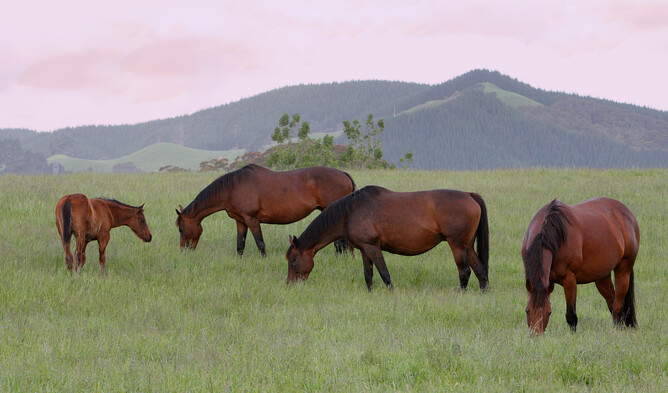Just on the outskirts of Cambridge, on the banks of the Waikato River, is New Zealand’s longest running commercial thoroughbred farm.
The origins of Trelawney Stud date back to 1930 when Seton Otway, a thoroughbred breeding enthusiast, purchased a 200-acre run-down dairy farm and developed it into one of the most successful breeding studs of its era.
Since Otway was at the helm the stud has changed hands on just two occasions, has grown to 175 hectares and is now owned by Brent and Cherry Taylor.
The stud’s core focus has shifted from standing thoroughbred stallions and managing horses for outside clients to cultivating a private bloodstock portfolio envied by many and the results speak for themselves.
Each year Trelawney Stud features as one of the top vendors at the New Zealand Bloodstock Yearling Sales and was leading vendor by average in 2023. The farm’s graduates go on to compete at elite level on both the domestic and international stage with the roll of honour list boasting names such as current Singapore Horse of the Year Lim’s Kosciuszko, five-time Trans-Tasman Group One winner and former New Zealand Horse of the Year Ocean Park and New Zealand Group One winners Two Illicit and Loire.
Like any good farmers, the Taylors retain their quality stock where possible to boost their breeding ranks, with some of their horses carrying three generations of Trelawney Stud bloodlines in their pedigrees.
The Taylors credit the farm’s ability to produce quality racehorses in part to a diverse farming portfolio that allows them to manage the pasture efficiently and effectively.
Each year the Taylors run a mixture of sheep and cattle alongside the 110-140 horses.
A flock of older breeding Romney ewes are run with a terminal Poll-Dorset sire and dependent of season, Trelawney Stud can fatten between 1800 – 2200 lambs per year.
Angus-mixed Cattle are brought in the spring and then sold off before the farm gets too wet in winter. At any one time, the farm can be home to 550 ewes, 750-1000 lambs and 160-180 head of cattle.
With Waikato farmland and pastures being a superb conditioner of any animal, the farm requires cattle to control the bulk of the grass with the sheep controlling the weed growth.
As a result of the great collaboration between the farm staff and the equine crew, Trelawney Stud considers itself a pristine piece of farming country that grows great lambs, fattens prime cattle and raises the highest quality of equine athletes.
“We are a small farming operation whose purpose is to raise racehorses and use the sheep and cattle to graze the farm effectively,” Managing Director Brent Taylor said.
“The sheep and cattle graze the property with the express job of preparing pasture for the horses who are notoriously picky eaters.
“We take soil and pasture samples regularly, apply fertiliser in the autumn, though this season we have decided to just apply lime at 2 tonne/ha.
“We also use chicory in our pasture renewal system, with pasture we want to renew sprayed out in the spring and chicory direct drilled.
“The crop will do two summers and be replaced with permanent pasture in the autumn. This gives us crop to feed our lambs through the summer and during high facial eczema periods and allows two full sprays between permanent pasture replacement with a low endophyte species.”
“We don’t generally mix stock species or age groups but prefer to allocate where and when they are suited. We also top pasture through the spring to control when required and winter spray pasture to control weeds.”
“Depending on the season, we may also cut bailage. This season 550 large round bales have been harvested, some of which feed out to cattle and also in pods to broodmares.”
“Clearly the horses are the greatest profit centre for us followed by lamb fattening and cattle.”
Trelawney Stud is a prime example of a farming system that uses a variety of livestock to get the most out of the land, enabling it to produce the best animals possible.
Whether it is horses, cattle or sheep – Trelawney Stud stamps its mark of quality on each animal that comes off their Waikato property.


